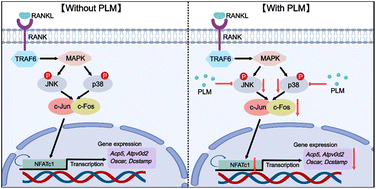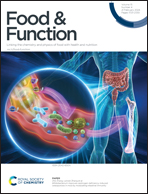Piperlongumine, a Piper longum-derived amide alkaloid, protects mice from ovariectomy-induced osteoporosis by inhibiting osteoclastogenesis via suppression of p38 and JNK signaling†
Abstract
Postmenopausal osteoporosis (PMOP) is a metabolic bone disease that results from overproduction and hyperactivation of osteoclasts caused by insufficient estrogen in women after menopause. Current therapeutic strategies are mainly focused on treating PMOP patients who have already developed severe bone loss or even osteoporotic fractures. Obviously, a better strategy is to prevent PMOP from occurring in the first place. However, such reagents are largely lacking. Piperlongumine (PLM), an amide alkaloid extracted from long pepper Piper longum, exhibits the anti-osteoclastogenic effect in normal bone marrow macrophages (BMMs) and the protective effect against osteolysis induced by titanium particles in mice. This study examined the preventive effect of PLM on PMOP and explored the potential mechanism of this effect using both ovariectomized mice and their primary cells. The result showed that PLM (5 and 10 mg kg−1) administered daily for 6 weeks ameliorated ovariectomy-induced bone loss and osteoclast formation in mice. Further cell experiments showed that PLM directly suppressed osteoclast formation, F-actin ring formation, and osteoclastic resorption pit formation in BMMs derived from osteoporotic mice, but did not obviously affect osteogenic differentiation of bone marrow stromal cells (BMSCs) from these mice. Western blot analysis revealed that PLM attenuated maximal activation of p38 and JNK pathways by RANKL stimulation without affecting acute activation of NF-κB, AKT, and ERK signaling. Furthermore, PLM inhibited expression of key osteoclastogenic transcription factors NFATc1/c-Fos and their target genes (Dcstamp, Atp6v0d2, Acp5, and Oscar). Taken together, our findings suggest that PLM inhibits osteoclast formation and function by suppressing RANKL-induced activation of the p38/JNK-cFos/NFATc1 signaling cascade, thereby preventing ovariectomy-induced osteoporosis in mice. Thus, PLM can potentially be used as an anti-resorption drug or dietary supplement for the prevention of PMOP.



 Please wait while we load your content...
Please wait while we load your content...